Exploring Sliding Door Costs – Comparing Bifold Doors, Sliding Doors and French Doors
When it comes to choosing the perfect type of patio door for your home, there are several to choose from, including French doors, sliding doors and bi-fold doors. While any new doors will help to enhance the functionality of your outdoor space, there are some fundamental differences between them, including their cost.
In this article, we will compare the cost of sliding doors to other door systems and examine the factors that can impact the affordability. We aim to help you to choose the right type of door for your home and budget.
Click the links below to jump to the relevant section:
Learn more about a number of factors that can impact the cost of your external doors.
Find out more about how bi-fold doors and sliding doors compare when it comes to cost.
Find out more about how the costs of sliding doors and French patio doors compare.
Find the answers to the commonly asked questions about sliding doors and their costs.
What can impact the cost of sliding doors?
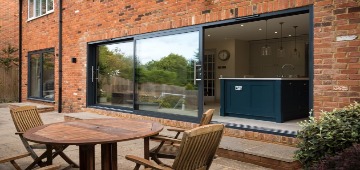
The cost of a sliding door system can vary considerably depending on the system installed, the number of panels required, the material they are made from, the type of glazing used, the colour, finish and the complexity of the installation.
Here is a quick overview of the factors to consider:
Material
The material the doors are made from is one of the biggest factors that can affect the cost. There are several options to choose from, but the most popular are composite, aluminium, steel and uPVC doors.
- Composite – Wood Plastic Composite (WPC) is commonly used in door frames because it's durable and versatile, but it can be bulky to operate and may not last as long which is not ideal when looking to invest in a door that offers long-term reliability.
- uPVC – this type of door is the most cost-effective option. uPVC sliding doors are easy to maintain, offer insulating properties and can be supplied in a range of colours. The key downside is they are typically only available in standard sizes and they have a budget appearance. They are also prone to twisting, discolouring and losing their alignment which will affect the smooth operation. Overall, the great prices may not be worth it in the long run.
- Aluminium – Aluminium sliding doors are sleek, lightweight, incredibly strong and offer the best security and the slimmest sightlines. Aluminium is typically more expensive than uPVC and composite material, but less expensive than the likes of steel. Because of its innate strength, it can offer slim sightlines with large maximum panel sizes, and offers long durability. Aluminium is powder coated, so offers a wide variety of colour choices.
- Steel – Ultimately strong, steel sliding doors offer many similar benefits of aluminium; it’s an elegant choice. However, steel door frames are heavier and come at a significantly higher cost than aluminium.
Ultimately, aluminium patio doors are a great investment but will cost more than composite material and uPVC. Aluminium frames support large glass panels, while maintaining a slim profile. They’re elegant, strong and built to stand the test of time, and additionally, can help increase the value of your home. Explore our stunning case studies for aluminium patio doors.

“We could not be happier with the finished project, and we cannot thank Freedom Bespoke and Origin enough for their hard work and attention to detail!”
System and manufacturer
Who makes your doors and the design that’s on offer will impact how much they cost. Manufacturers who design and build in Britain, have extensive quality controls, precision engineering, highly trained staff and who custom build every product will be more expensive than those who don’t.
Even different systems by the same manufacturer may carry a different cost, according to its performance and design features. Costs will also vary according to size, colour, hardware choice, configuration, and glazing choice.
Explore the systems of Origin Patio Sliding Doors available:
 OS-29+ This striking set of sliding doors offers the slimmest sightlines available and the best thermal performance |  OS-44 This option is fantastic for letting light flood in with great views of the garden area |  OS-77 Highlight the beauty of the premium aluminium frames with this classic door design |
Contact your local installer to start a project
Door size
The size of the door is also a major factor to consider. Smaller doors will be cheaper as they use less material. Additionally, if you are buying off-the-shelf, this will be cheaper than going down a bespoke route with the product customised to your requirement.
Configuration
One of the main advantages of sliding doors is that the series of panels can be configured in a number of different ways - sliding all the way to the right, all the way to the left, opening on both sides for easy access or opening in the middle. The versatile opening options help you make the most out of your space.
Complicated or larger configurations can add to the cost of the product and installation. Read about sliding door panel and configuration options. Having fewer doors at a wider size will also be less than having more doors installed in the same aperture. Origin Sliding Doors boast large maximum sizes.
Colours
There is a large choice of colours for Origin Sliding Doors. Over 150 RAL colour options are available to make your dream patio door possible. Popular choices of colours will be available with unbeatable lead times and often slightly cheaper. Unusual colours may potentially carry a surcharge.
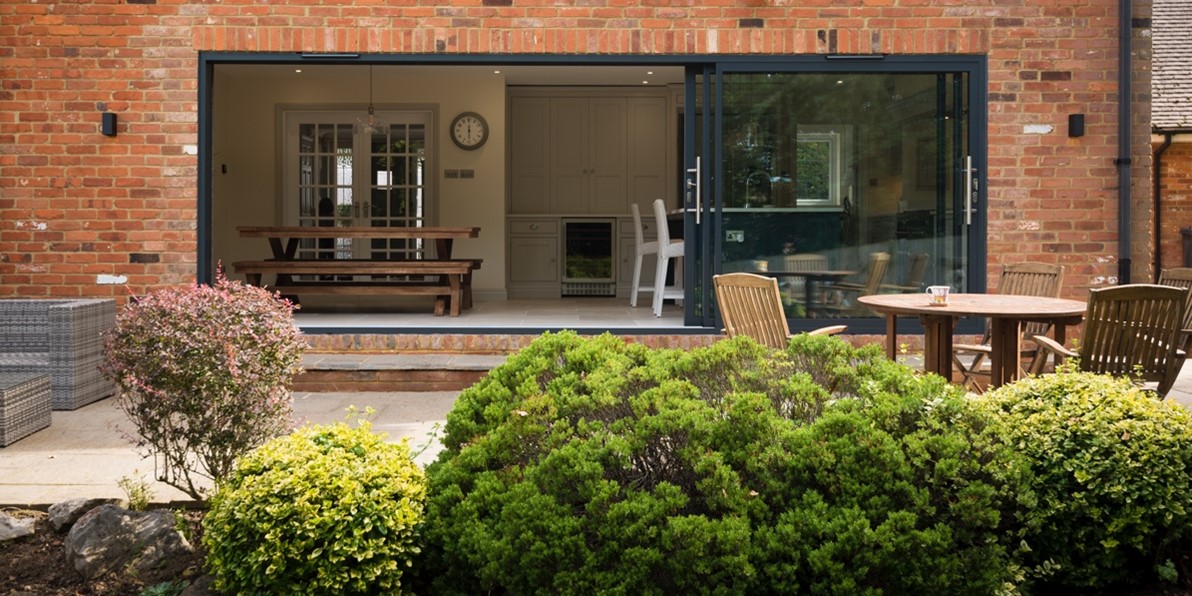
Choosing an Origin Installer
At Origin, our Sliding Doors are checked and tested at every stage of the manufacturing process to make sure our British-made doors meet our unrelenting high quality standards.
Our network of Origin partners gives you the peace of mind of a stress-free project. However, it's important to find an installer who is trained and knowledgeable in installing Origin Doors. Also be sure to check out the aftermarket warranty on offer, as they will be the company required to undertake any remedial work.
Find your local installer today to bring your vision to life
Bi-fold door vs sliding door cost
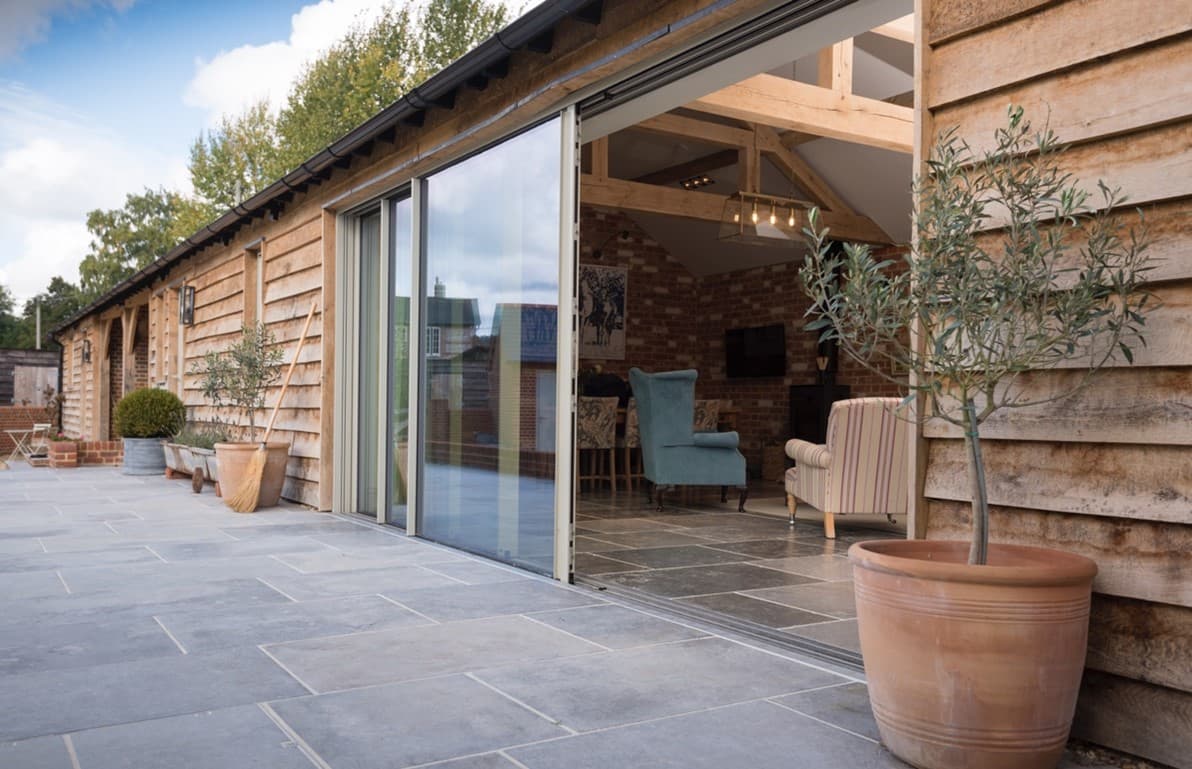
It’s difficult to provide an exact cost for sliding doors or bi-fold doors as the cost depends on so many different factors including:
- Installation costs – the installation costs for bi-fold or sliding doors can vary depending on the size of the doors and whether you’re replacing existing doors or if it’s going into a new aperture. Generally, both will require careful structural consideration.
- Delivery costs – a large sliding door with triple glazing will not only be more expensive to buy initially, but it can also cost more to deliver. In some cases, specialist delivery vehicles will be required.
- Glazing costs – the type of glazing you choose can also affect the cost of your doors. Your installer will source the glass based on your requirements.
- Size of aperture – if you require a bigger door, it will cost more to manufacture. Origin’s range of Bi-fold and Sliding Doors are bespoke, so are tailored to meet your specific needs, meaning you can configure your door exactly the way you want.
- Final Verdict – For the same space, specified with the same glass, installing the perfect bifold door will offer slightly better affordability compared to sliding patio doors
Cost of sliding doors vs French doors
External French Doors are typically the cheapest option for patio doors when compared to sliding doors or bifold patio doors, but they do not offer the same huge glass expanses and subsequent natural light as sliding doors.
They cost less than sliding doors because they’re usually smaller and use simple hinges as opposed to track systems. French Doors are typically suitable for narrower apertures, but fixed frames can be used either side as flags to extend their impact.
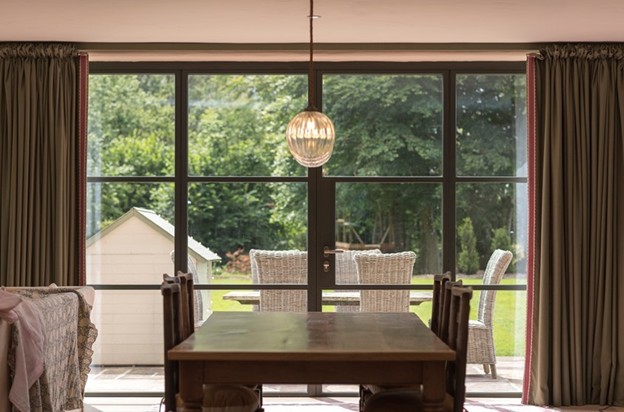
Frequently Asked Questions
Bi-fold doors vs sliding doors: which is better?
Both of these patio doors come with numerous benefits. External Bifold Doors can be stacked and folded to the side, leaving the aperture completely open when the doors are folded back. Sliding doors can have slimmer sightlines, but as the opening happens on one track, they can’t slide completely away. This means that at least one pane is always visible when the doors are open.
How much does it cost to install a sliding patio door?
This is almost impossible to answer. The cost of installation will depend on several factors, including the size of the door, the material it’s made from, the type of glazing used, the colour and the installer you choose. Contact your local installer to understand the potential costs of your project.
What are the advantages of exterior sliding doors?
Exterior sliding doors have slim sightlines that allows plenty of light into your home. At Origin, our OS-29+ Patio Sliding Door offers ultra-slim sightlines to maximise views of the outdoors and natural light, and an unparalleled energy efficiency with U-Values as low as 0.78 when specified with triple glazing.
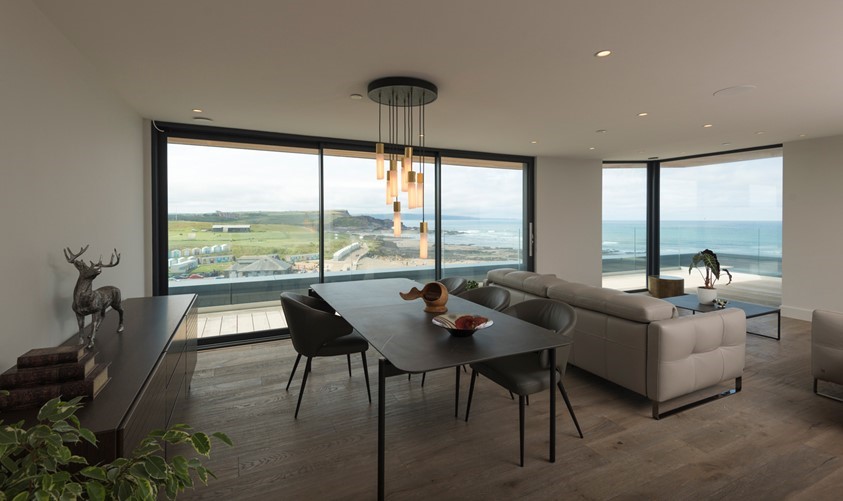
What different materials can a sliding door be made from and do these vary in cost?
Sliding doors can be made from a wide range of materials, but the most common are aluminium, composite, uPVC and steel. Steel is typically the most expensive, followed by aluminium, composite and uPVC. However, aluminium is extremely durable, yet lightweight, making it a practical and long-lasting choice. At Origin, we manufacture premium sliding doors in aluminium, which is one of the reasons that allows us to offer a guarantee of up to 20 years.



.jpg?v=639070128471450972)


